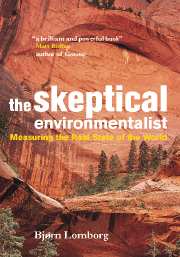Book contents
- Frontmatter
- Contents
- List of figures
- List of tables
- Preface
- Language and measures
- Acknowledgements
- Permissions
- Part I The Litany
- Part II Human welfare
- 3 Measuring human welfare
- 4 Life expectancy and health
- 5 Food and hunger
- 6 Prosperity
- 7 Conclusion to Part II: unprecedented human prosperity
- Part III Can human prosperity continue?
- Part IV Pollution: does it undercut human prosperity?
- Part V Tomorrow's problems
- Part VI The Real State of the World
- Notes
- Bibliography
- Index
5 - Food and hunger
Published online by Cambridge University Press: 05 March 2013
- Frontmatter
- Contents
- List of figures
- List of tables
- Preface
- Language and measures
- Acknowledgements
- Permissions
- Part I The Litany
- Part II Human welfare
- 3 Measuring human welfare
- 4 Life expectancy and health
- 5 Food and hunger
- 6 Prosperity
- 7 Conclusion to Part II: unprecedented human prosperity
- Part III Can human prosperity continue?
- Part IV Pollution: does it undercut human prosperity?
- Part V Tomorrow's problems
- Part VI The Real State of the World
- Notes
- Bibliography
- Index
Summary
“The battle to feed humanity is over. In the course of the 1970s the world will experience starvation of tragic proportions – hundreds of millions of people will starve to death.” This was the introduction to one of the most influential books on hunger, Paul Ehrlich's The Population Bomb published in 1968. More than 3 million copies of the book have been sold.
Ehrlich runs down what he calls the “professional optimists”: “They say, for instance, that India in the next eight years can increase its agricultural output to feed some 120 million more people than they cannot after all feed today. To put such fantasy into perspective one need consider only …”, and Ehrlich presented a whole list of reasons why this could not be achieved. And sure enough, it turned out that the figure of 120 million did not hold water. Eight years later India produced enough food for 144 million more people. And since the population had grown by ‘only’ 104 million, this meant there was more food to go round.
From the same quarter Lester Brown, who later became president of the Worldwatch Institute, wrote in 1965 that “the food problem emerging in the less-developing regions may be one of the most nearly insoluble problems facing man over the next few decades.”
- Type
- Chapter
- Information
- The Skeptical EnvironmentalistMeasuring the Real State of the World, pp. 60 - 69Publisher: Cambridge University PressPrint publication year: 2001



